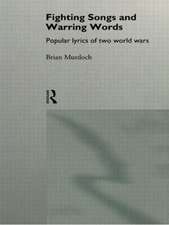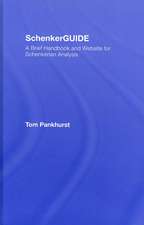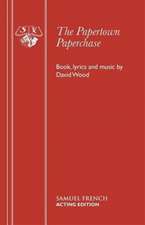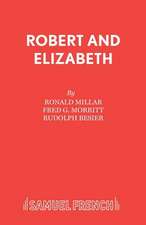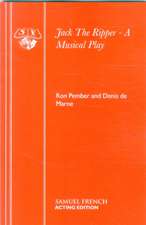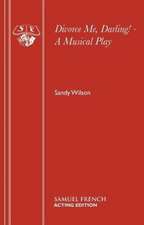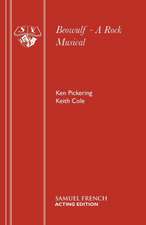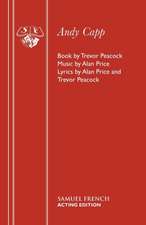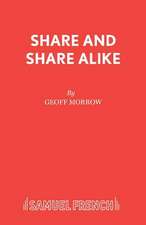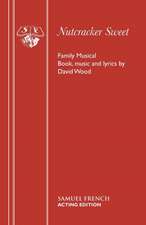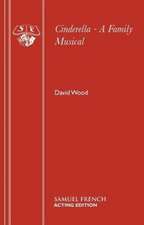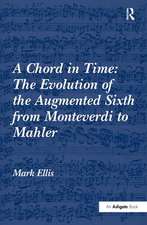Philosophy of Song and Singing: An Introduction
Autor Jeanette Bicknellen Limba Engleză Paperback – 10 iul 2015
- The relationship between the meaning of a song’s words and its music
- The performer’s role and the ensuing gender complications, social ontology, and personal identity
- The performer’s ethical obligations to audiences, composers, lyricists, and those for whom the material holds particular significance
- The metaphysical status of isolated solo performances compared to the continuous singing of opera or the interrupted singing of stage and screen musicals
Each chapter focuses on one major musical example and includes several shorter discussions of other selections. All have been chosen for their illustrative power and their accessibility for any interested reader and are readily available.
| Toate formatele și edițiile | Preț | Express |
|---|---|---|
| Paperback (1) | 438.86 lei 6-8 săpt. | |
| Taylor & Francis – 10 iul 2015 | 438.86 lei 6-8 săpt. | |
| Hardback (1) | 996.33 lei 6-8 săpt. | |
| Taylor & Francis – 23 iul 2015 | 996.33 lei 6-8 săpt. |
Preț: 438.86 lei
Nou
Puncte Express: 658
Preț estimativ în valută:
83.99€ • 87.57$ • 69.80£
83.99€ • 87.57$ • 69.80£
Carte tipărită la comandă
Livrare economică 21 martie-04 aprilie
Preluare comenzi: 021 569.72.76
Specificații
ISBN-13: 9781138790674
ISBN-10: 1138790672
Pagini: 140
Dimensiuni: 152 x 229 x 10 mm
Greutate: 0.2 kg
Ediția:1
Editura: Taylor & Francis
Colecția Routledge
Locul publicării:Oxford, United Kingdom
ISBN-10: 1138790672
Pagini: 140
Dimensiuni: 152 x 229 x 10 mm
Greutate: 0.2 kg
Ediția:1
Editura: Taylor & Francis
Colecția Routledge
Locul publicării:Oxford, United Kingdom
Cuprins
Preface. Acknowledgments. Chapter One "Words". Chapter Two "Music". Chapter Three "Giving Voice (What Do Singers Do?)". Chapter Four "Singers and Audiences". Chapter Five "Three Ways to Think about Authenticity in Performance". Chapter Six "Authenticity, Value & Technology". Chapter Seven "Performance: Ethical Considerations". Chapter Eight "Song & Drama". Chapter Nine "Meaning: Songs in Performance". Chapter Ten "Why Sing?"
Recenzii
"Jeanette Bicknell’s Philosophy of Song and Singing is a convincing addition to the body of work in musical aesthetics, which has tended to emphasize music alone. Song and Singing offers a framework for understanding singing, itself, that is philosophically solid, yet very accessible for undergraduates in all specializations who are interested in exploring more about the nature of musical performance."
Jennifer Judkins, UCLA Herb Alpert School of Music, USA
"Even very simple songs can yield profound (and profoundly moving) performances, and Jeanette Bicknell's A Philosophy of Song and Singing is an engaging exploration of songs and their performance. Written with admirable clarity, this is an important contribution to the aesthetics of music."
Theodore Gracyk, Minnesota State University Moorhead, USA
"Bicknell has thought long, hard, and lovingly about song and its place in our lives, and the results on display in this book are as refreshing as they are provocative."
Jerrold Levinson, University of Maryland, USA
"Bicknell’s book considers not only 'purely musical' matters of singing and vocal technique but also the larger social, political, and cultural contexts in which the various practices of singing arise and are enjoyed, including such diverse matters as the public persona and physical appearance of singers and the roles that digital technologies such as Auto-Tune play in the expectations of singers and audiences. A Philosophy of Song and Singing is an important contribution to the philosophical literature on song and singing."
Philip Alperson, Temple University, USA
"Bicknell’s erudition is impressive. The book is scholarly yet accessible to undergraduate students. When philosophers and theories are mentioned, they are followed by precise, brief expositions. Thus, the book is appropriate for students with little or no background in philosophy. Its brevity and concision are also virtues for teaching. For those looking for expanding standard, core aesthetics courses with an interesting, specific subfield, or for those focusing on music, this book is a welcome addition and an "affordable" option for its brevity (it does not add too much to one’s already hefty or crowded syllabus). If one is looking for a way to incorporate popular art forms and genres into one’s aesthetics syllabus, then this book is a good choice. For courses emphasizing the philosophy of the performing arts, this book may be used with David Davies’s Philosophy of the Performing Arts. Even philosophy of language courses could benefit from such a book, since the book addresses some issues in vocalization, pragmatics, sociolinguistics, and meaning."
--Tobyn Demarco in Teaching Philosophy
"Jeanette Bicknell’s Philosophy of Song and Singing is a convincing addition to the body of work in musical aesthetics, which has tended to emphasize music alone. Song and Singing offers a framework for understanding singing, itself, that is philosophically solid, yet very accessible for undergraduates in all specializations who are interested in exploring more about the nature of musical performance."
--Jennifer Judkins, UCLA Herb Alpert School of Music, USA
"Even very simple songs can yield profound (and profoundly moving) performances, and Jeanette Bicknell's A Philosophy of Song and Singing is an engaging exploration of songs and their performance. Written with admirable clarity, this is an important contribution to the aesthetics of music."
--Theodore Gracyk, Minnesota State University Moorhead, USA
"Bicknell has thought long, hard, and lovingly about song and its place in our lives, and the results on display in this book are as refreshing as they are provocative."
--Jerrold Levinson, University of Maryland, USA
"Bicknell’s book considers not only 'purely musical' matters of singing and vocal technique but also the larger social, political, and cultural contexts in which the various practices of singing arise and are enjoyed, including such diverse matters as the public persona and physical appearance of singers and the roles that digital technologies such as Auto-Tune play in the expectations of singers and audiences. A Philosophy of Song and Singing is an important contribution to the philosophical literature on song and singing."
--Philip Alperson, Temple University, USA
"This accessible work is an important addition to philosophical literature on singing. Summing Up: Recommended."
- S. C. Champagne, Oberlin College Conservatory of Music in CHOICE
Jennifer Judkins, UCLA Herb Alpert School of Music, USA
"Even very simple songs can yield profound (and profoundly moving) performances, and Jeanette Bicknell's A Philosophy of Song and Singing is an engaging exploration of songs and their performance. Written with admirable clarity, this is an important contribution to the aesthetics of music."
Theodore Gracyk, Minnesota State University Moorhead, USA
"Bicknell has thought long, hard, and lovingly about song and its place in our lives, and the results on display in this book are as refreshing as they are provocative."
Jerrold Levinson, University of Maryland, USA
"Bicknell’s book considers not only 'purely musical' matters of singing and vocal technique but also the larger social, political, and cultural contexts in which the various practices of singing arise and are enjoyed, including such diverse matters as the public persona and physical appearance of singers and the roles that digital technologies such as Auto-Tune play in the expectations of singers and audiences. A Philosophy of Song and Singing is an important contribution to the philosophical literature on song and singing."
Philip Alperson, Temple University, USA
"Bicknell’s erudition is impressive. The book is scholarly yet accessible to undergraduate students. When philosophers and theories are mentioned, they are followed by precise, brief expositions. Thus, the book is appropriate for students with little or no background in philosophy. Its brevity and concision are also virtues for teaching. For those looking for expanding standard, core aesthetics courses with an interesting, specific subfield, or for those focusing on music, this book is a welcome addition and an "affordable" option for its brevity (it does not add too much to one’s already hefty or crowded syllabus). If one is looking for a way to incorporate popular art forms and genres into one’s aesthetics syllabus, then this book is a good choice. For courses emphasizing the philosophy of the performing arts, this book may be used with David Davies’s Philosophy of the Performing Arts. Even philosophy of language courses could benefit from such a book, since the book addresses some issues in vocalization, pragmatics, sociolinguistics, and meaning."
--Tobyn Demarco in Teaching Philosophy
"Jeanette Bicknell’s Philosophy of Song and Singing is a convincing addition to the body of work in musical aesthetics, which has tended to emphasize music alone. Song and Singing offers a framework for understanding singing, itself, that is philosophically solid, yet very accessible for undergraduates in all specializations who are interested in exploring more about the nature of musical performance."
--Jennifer Judkins, UCLA Herb Alpert School of Music, USA
"Even very simple songs can yield profound (and profoundly moving) performances, and Jeanette Bicknell's A Philosophy of Song and Singing is an engaging exploration of songs and their performance. Written with admirable clarity, this is an important contribution to the aesthetics of music."
--Theodore Gracyk, Minnesota State University Moorhead, USA
"Bicknell has thought long, hard, and lovingly about song and its place in our lives, and the results on display in this book are as refreshing as they are provocative."
--Jerrold Levinson, University of Maryland, USA
"Bicknell’s book considers not only 'purely musical' matters of singing and vocal technique but also the larger social, political, and cultural contexts in which the various practices of singing arise and are enjoyed, including such diverse matters as the public persona and physical appearance of singers and the roles that digital technologies such as Auto-Tune play in the expectations of singers and audiences. A Philosophy of Song and Singing is an important contribution to the philosophical literature on song and singing."
--Philip Alperson, Temple University, USA
"This accessible work is an important addition to philosophical literature on singing. Summing Up: Recommended."
- S. C. Champagne, Oberlin College Conservatory of Music in CHOICE
Descriere
In Philosophy of Song and Singing: An Introduction, Jeanette Bicknell explores philosophical questions that have not yet been thoroughly researched by philosophers, musicologists, or scientists. Issues addressed include: the relationship between the meaning of a song’s words and its music; the performer’s role and ensuing gender complications, social ontology, and personal identity; the performer’s ethical obligations to audiences, composers, and lyricists; and the metaphysical status of isolated solo performances compared to the continuous singing of opera or the interrupted singing of stage and screen musicals. Each chapter focuses on one major musical example.


